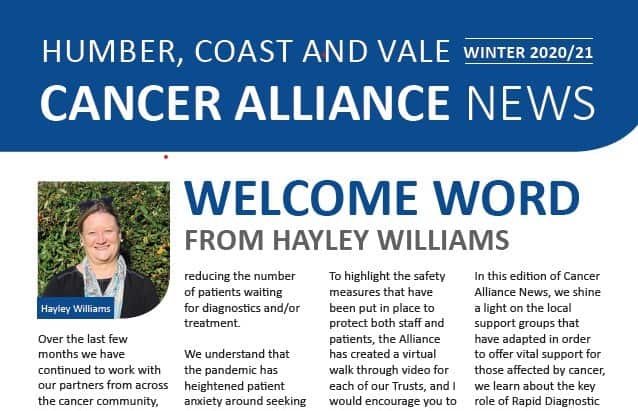


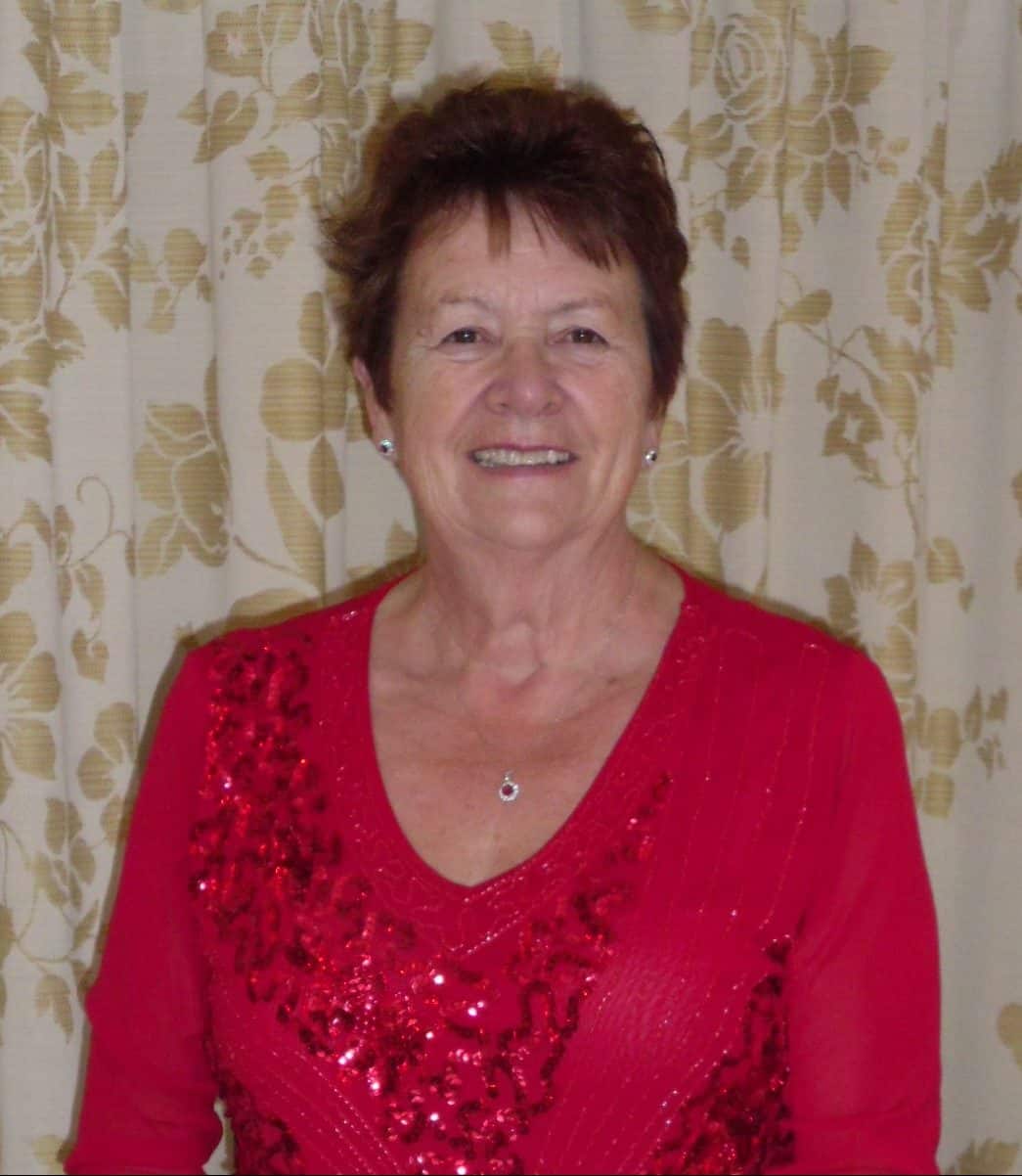
After experiencing persistent symptoms that weren’t normal for her, Christine was diagnosed with pancreatic cancer. Here, she tells her story and explains her advice for anyone experiencing something similar.
Towards the end of January 2019, my entire body began to feel itchy. I tried everything to stop it, from soothing sprays to creams and antihistamine tablets, but nothing worked. I wasn’t in any pain anywhere, but I felt maybe a little more tired.
On 1st February at around 3 am, I couldn’t stand the itching anymore, and asked my husband to take me to A&E, where I’d hoped they’d give me a strong antihistamine injection or some tablets to help. However, the young doctor who saw me insisted on doing a blood test, which I think saved my life.
After waiting a while, I received my results. The doctors said there may be a blocked liver duct, but I’d need more tests to confirm this. I was allowed to go home but would return for CT scans and MRI appointments. On Monday morning, I felt ‘out of sorts’ and fainted at home. Martin, my husband, took me back to the hospital, where they kept me in for 5 days to do some tests.
Over the next few weeks, I had various other tests done. I also started being jaundiced and my urine was much darker than usual. It was evident something was seriously wrong, so an appointment was made to see the consultant at Castle Hill.
The consultant at Castle Hill confirmed I had pancreatic cancer and was faced with two options. I could either have a Whipple’s procedure, which would give me at least another five years, or do nothing, which would leave me with five to eight months.
I returned for further scans the next day and would be back in hospital on the 13th March for surgery on the 14th. I brought an overnight bag with me for my scans, so the consultant decided to keep me in until the next day for my pre-op tests. However, whilst on the ward, I needed rehydrating, and was kept in the hospital until my operation.
My operation, which required two surgeons, lasted for 10 hours and I spent 10 days in the Intensive Care Unit (ICU) until finally arriving home on the 5th April.I felt isolated without the ward staff but was very well looked after by Martin and by friends who would do anything for us. Some kind friends had given us a hospital bed to use at home, and Martin made a bedroom for me in the dining room. I actually stayed downstairs until January 2020!
When I left the hospital, I was given a prescription of Creon tablets, which is a medication to replace the enzymes usually made by the pancreas to break down food. I have to take these tablets with everything I eat.
I also began chemotherapy in June 2019, which I had for six months. I recovered well from this and my main problem since has been with my digestive system. I have learned to live with this, however, and I am hoping to speak to the dietician again to see if anything can be done to ease my digestive problems.
”I am now 20 months on from the major surgery and delighted to say I am in remission.
I still see my oncologist every four months to have my bloods checked, and then every six months for a CT scan.
If anyone has anything ‘different’ happening to them, i.e. it’s not normal for you, seek professional advice. Although it pays to talk things over with family and friends and look online, you can’t believe everything you’re told or see on the internet. Speak to your GP as they have the experience and knowledge to help you best. Staying positive helped me with my recovery, so I’d always recommend that!
Symptoms of pancreatic cancer can include:
For more information, go to https://www.nhs.uk/conditions/pancreatic-cancer/.
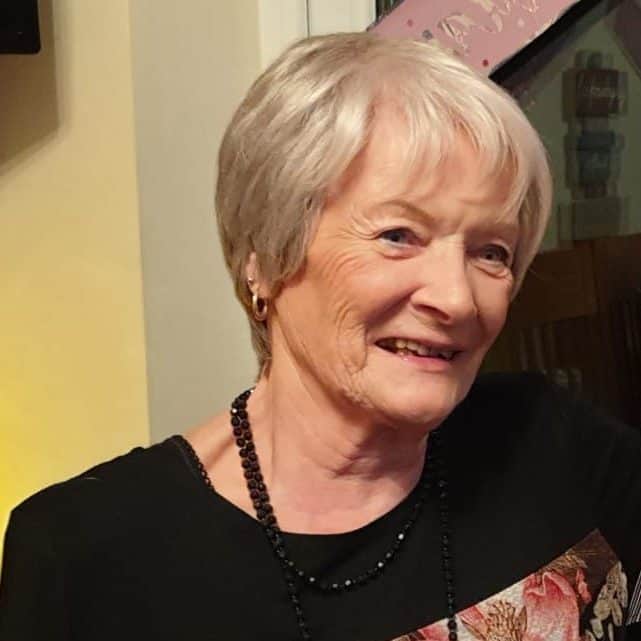
Mum, grandma and former Medical Secretary Margaret didn’t experience any pain before her cancer diagnosis but still booked an appointment with her GP. Here, Margaret describes her cancer journey and highlights the importance of noticing whether a symptom is ‘normal’ for you.
My cancer diagnosis came as a shock. I felt well. I didn’t have a sore throat or any pain in my mouth, and I wasn’t experiencing any problems swallowing. The only thing different was that I felt like I had a hair in my mouth and needed to swallow more often. The symptom was persistent, so after a couple of months, I used a mirror to look into my throat, where I saw what looked like a tiny eye or shiny circle, and immediately booked an appointment with my GP.
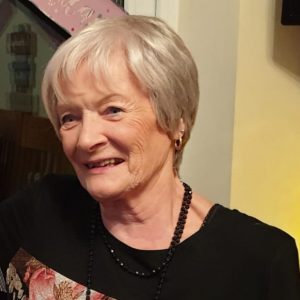
Margaret’s symptom was persistent, unexplained, and unusual for her. Talk to your GP if you’re experiencing a symptom that is any of these.
My GP referred me to a consultant who, within 10 days, organised for me to attend the hospital as a day case and have the tonsil removed. Another 10 days after that, I saw the consultant again to receive the results of a biopsy on the tonsil. The consultant informed me it was cancer, more specifically, a lymphoma. My official diagnosis was a first-grade non-Hodgkin large cell lymphoma that had been caught early.
A couple of weeks later, I went for chemotherapy. In the end, I only had two sessions of the chemo, as it made me feel really unwell, and the results proved another session wouldn’t benefit me that much. Instead, I had radiotherapy a few weeks later.
Since my cancer diagnosis, I’ve tried to remain positive and keep looking forward. My role model has been my younger sister, who was diagnosed with pancreatic cancer six months before my own diagnosis. Like me, she didn’t have many symptoms – only an itch for a week or so. She has since had an operation and is now doing well.
I lost a lot of weight because of my tonsillectomy, chemo, and radiotherapy, and have experienced other side-effects such as a sore throat, mouth, and neck. Most of my other side effects have disappeared. I’m slowly getting back to a healthy weight and have been drinking nutritional supplement milkshakes to help. I began to experience extreme tiredness after undergoing x-rays, blood tests, a colonoscopy, and taking steroids to treat a cough I’ve had since my chemotherapy. I’ve stayed in touch with my Macmillan nurse, a dietitian and my GP practice nurse throughout everything.
I have COPD and diabetes, which have both made me feel weak, but since beginning to take long daily walks on the seafront, I’ve felt so much better. I still have the cough, but I’m using medication and a Flutter to manage it. I’m also having B12 injections and taking iron tablets to reduce my tiredness.
I have been continually checked on by health professionals, and the questions they asked ensured I informed them of anything and everything that was not normal to me. They never made me feel guilty about asking questions or getting in contact a lot. Everyone was helpful and caring. They let nothing go unchecked, which is what revealed my B12 deficiency – it may have gone unnoticed for some time otherwise.
My advice to others in my position would be to stay positive and see the future as something to look forward to – always keep the little things in mind. You can’t expect every day to be good so listen to your body. If you need to sit down or sleep – do so.
Always remember to talk to your GP about any problems or symptoms concerning you and get help when you need it!
If you’re experiencing a persistent ache or pain, unexplained weight loss, or an unusual lump. Speak to your GP. Remember, if it’s persistent, unexplained, or unusual for you, it’s important to get it checked.
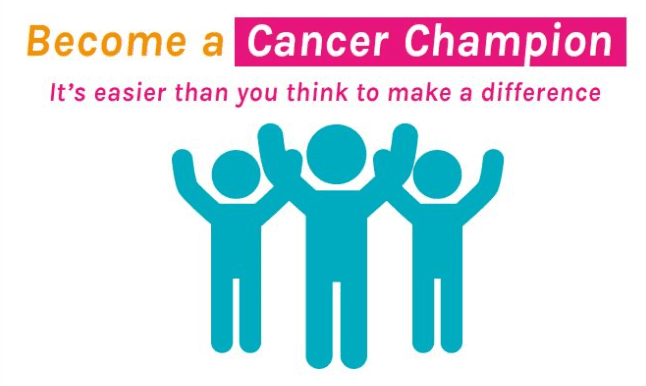
Over 2,020 Cancer Champions are helping to raise awareness of the symptoms of cancer and encourage early detection of cancer across Scarborough, Hull, East Riding of Yorkshire, Vale of York and North and North East Lincolnshire.
Detecting cancer early can increase chances of survival and the HCV Cancer Alliance’s Cancer Champion Programme aims to teach people about the early signs of cancer, and equip them with the information needed to engage in conversations about cancer.
Cancer Champions are able to use the knowledge gained from a free 90 minute session, to encourage their friends, family and colleagues to contact their GP if they are worried about a symptom of cancer, promote uptake of national cancer screening programmes and encourage healthy lifestyle choices to reduce the risk of cancer.
Cancer awareness sessions have been delivered in local schools, businesses, community venues, and more recently online. In August 2020, HCV Cancer Alliance introduced virtual sessions after face-to-face training was paused as a result of the coronavirus pandemic. Emma Lewin, Volunteer Co-ordinator for the programme, explains: “We started delivering face-to-face awareness sessions in September 2018 and had set a goal of reaching 2,020 Cancer Champions in 2020. However, during the first wave of the pandemic all sessions were paused until further notice and we had to adapt in order to continue the programme and keep sharing the important messages about knowing your body and what is and isn’t normal for you.
“By introducing virtual sessions, we were pleased to be able to continue increasing the number of people in the HCV area equipped to have those potentially life-saving conversations within local communities.”
The programme has received positive feedback from participants, with one Cancer Champion saying: “This really opened my eyes and made me realise how important it is to educate yourself, your loved ones, friends and the public on cancer and possibly catch it earlier to save someone’s life.” Another recently trained Cancer Champion said: “Given how common cancer is, it made me really think about how little I talk about it with family and friends.”
To sign up for a free 90 minute cancer awareness session or to find out more, visit https://hnycanceralliance.org.uk/cancerchampions/
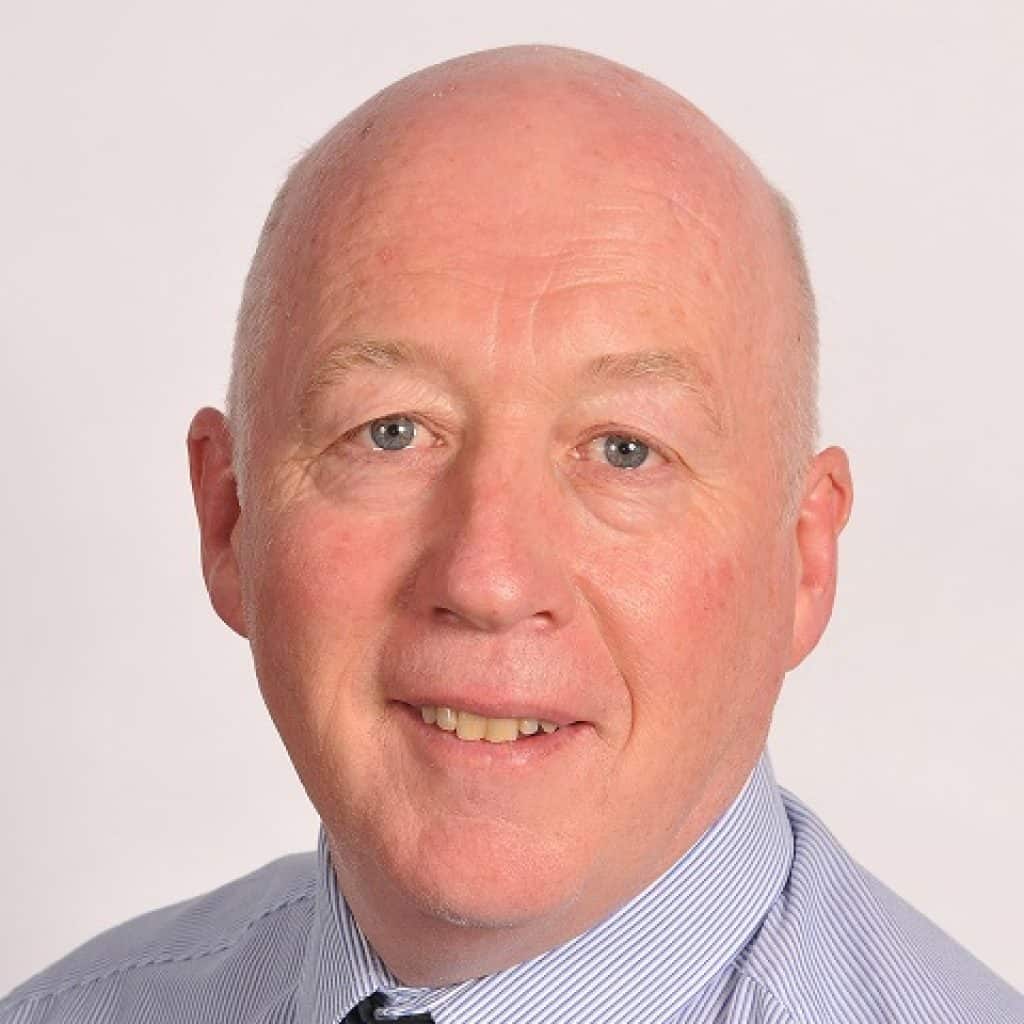
November is Lung Cancer Awareness Month and health care professional across Humber, Coast and Vale are urging the public to contact their GP if experiencing symptoms of lung cancer.
Since the beginning of the pandemic, the number of people speaking to their GP about potential symptoms of lung cancer decreased which resulted in the number of urgent cancer referrals falling to 36% in April 2020 when compared to 2019.
While the number of lung cancer referrals is back up to 65% of pre-coronavirus levels, there are still people with worrying symptoms not contacting their GP. This may be partly because the symptoms of lung cancer are very similar to the symptoms of coronavirus.
Dr Vince Rawcliffe, GP Lead for Cancer at NHS Hull CCG explains,
“Early symptoms of lung cancer and the common symptoms of coronavirus are similar and we understand why people might be hesitant to contact their GP about these symptoms.
“A persistent cough or breathlessness, coughing up blood, unexplained weight loss and tiredness or an ache or pain when breathing or coughing are all early signs of lung cancer. If you’re experiencing any of these symptoms, please give your GP a call. The sooner you tell us about these symptoms, the sooner we can help you.
“If you’re suffering from a high temperature, a new, continuous cough that feels dry, breathlessness or a change in your sense of smell or taste, it may be coronavirus. Book a test and self-isolate until you’ve received your results. If your results are negative and your symptoms persist, book an appointment with your GP.“
Early diagnosis of cancer can often mean treatment is simpler and more effective. 70% of lung cancer patients will survive for at least a year if diagnosed at the earliest stage. However, research has revealed that almost half (48%) of the public would delay or not seek medical help at all about a potential cancer symptom.
Dr Stuart Baugh, Clinical Director for Humber, Coast and Vale Cancer Alliance said,
“We want to help anyone experiencing symptoms of lung cancer. It’s important we see you early when treatment may be more effective.
“If you are invited to visit the hospital for an x-ray appointment, please attend. There are a range of measures in place to make it safer for both you and staff including PPE and COVID-19 secure areas. The NHS is still here for you and from the start of the pandemic in March to the end of August, 93% of people urgently referred for cancer were seen within 2 weeks.”
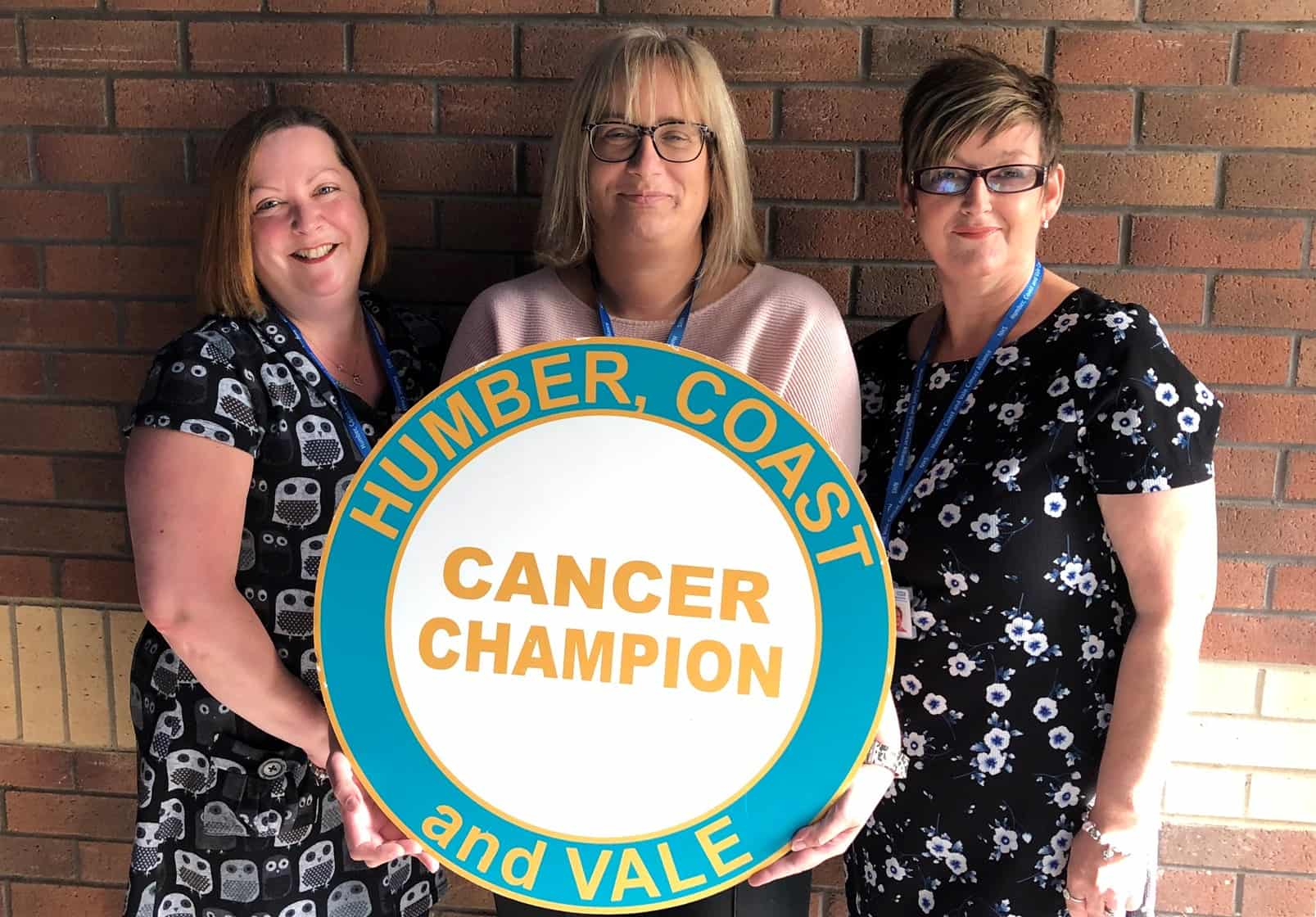
Over the last two years, Humber, Coast and Vale Cancer Alliance have helped to raise awareness of cancer by delivering free Cancer Champion awareness sessions to over 2,000 people across the Humber, Coast and Vale region.
Here you can find out more about the trainers behind the programme, as Emma, Zoe and Sarah share information about the programme, their roles and what it means to be a Cancer Champion.
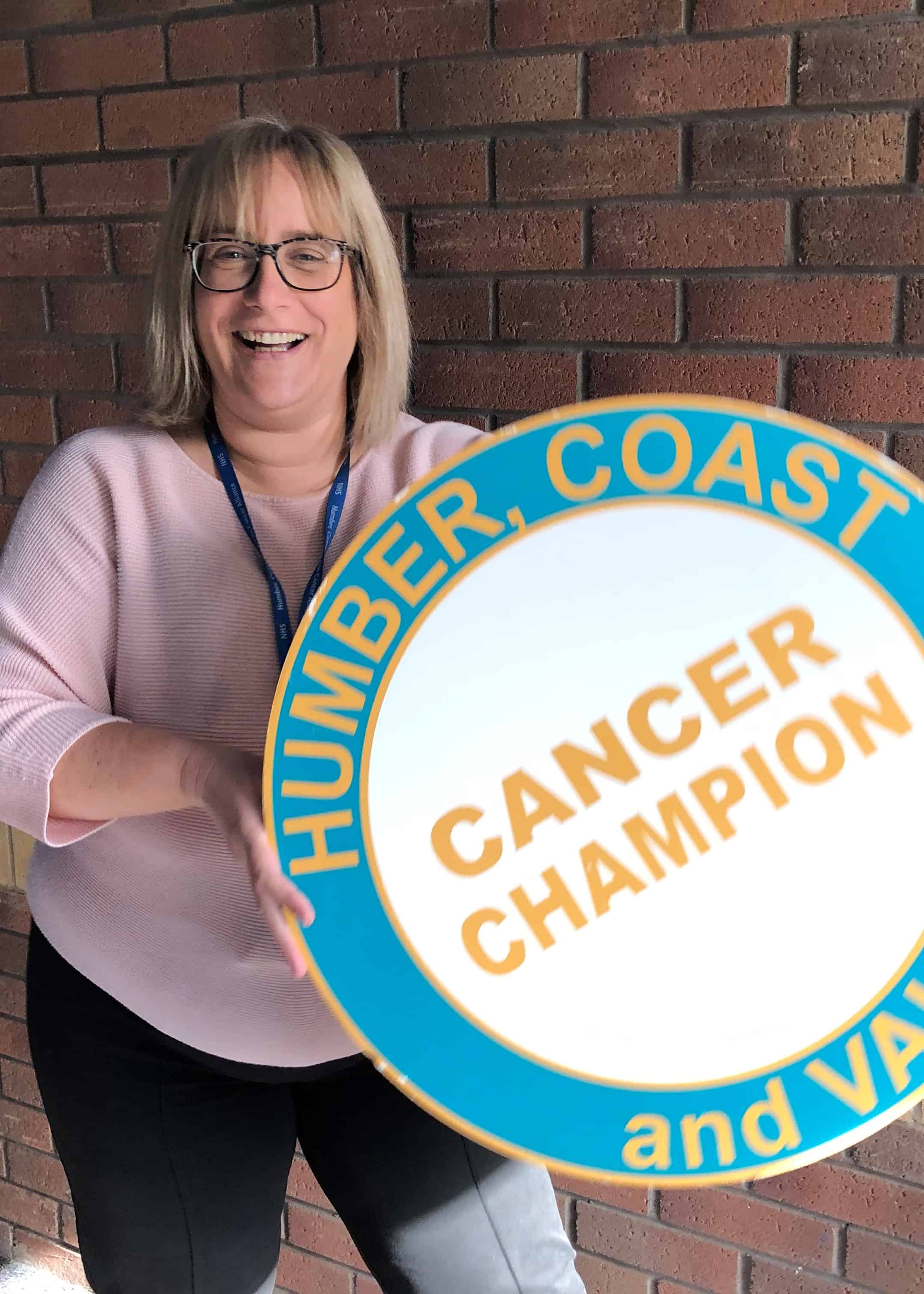
Tell us a little bit about yourself
I have worked for the NHS for 8 years in administrative roles after working in the private sector in a variety of industries. I received a Business Administration degree last year (quite a few years after leaving school at the age of 16).
I have a 10 year old daughter and was very proud when she was telling me about the nurse coming to her school to talk about “body changes” and they mentioned about breast checking and how important this is. She told them, “I already know about this, as mummy talks about doing this in her job”.
What is the best part of your job?
I have loved getting out and about to deliver the Cancer Champion sessions around Humber, Coast and Vale area over the last 2 years and have met hundreds of people, helped make them aware about the early signs and symptoms of cancer and heard their stories.
During the first lockdown, we were able to develop our Cancer Champion workshops so that we could continue to deliver them albeit virtually, so that we can continue sharing the important messages about cancer and screening.
What does delivering Cancer Champion awareness sessions mean to you?
I was diagnosed in 2002 with a benign brain tumour and received stereotactic radiotherapy which shrank it in size and meant that no further treatment was required. I also have friends and family who have been diagnosed with cancer and this is something that inspires me to want to help more people to be aware of those early signs and symptoms of cancer and help them to seek assistance early.
If you share one piece of advice about cancer, what would it be?
Know your body – what is “normal” for you and be aware if anything changes; a lump that appears, a cough that doesn’t clear or sudden weight loss/gain without trying and that if something changes to seek medical assistance.
Tell us a little bit about yourself
I joined the Cancer Champion programme in 2019 after my best friend was diagnosed with stage 3 breast cancer. She was only 36, had two young children and was recently separated from her husband. I’ll never forget her words “I have breast cancer, I’m scared I’m going to die”. Thankfully the cancer hadn’t spread and I supported her through her cancer treatment, seeing first hand, the impact her diagnosis had, on both her and her family. It was at the same time I learnt that 1 in 8 women will receive a breast cancer diagnosis in their lifetime.
As a Cancer Champion trainer, I love being able to inspire people to feel confident talking about cancer and to promote the importance of the NHS cancer screening programmes, all of which aim to detect cancer at an early stage.

What is the best part of your job?
Receiving the ‘Cancer Champion Pledges’ after each session. It’s fantastic when you read what impact the session has had and reading how Cancer Champions plan to use their ‘new’ knowledge about cancer, signs and symptoms and to share our vital cancer messages. A great example, “I pledge to encourage my children to get into good habits of self-checking themselves on a regular basis and to continue to do so. I also now have the information and knowledge to talk confidently and sign post people I come into contact with regarding getting checked out when necessary.”
What does delivering Cancer Champion awareness sessions mean to you?
I feel extremely privileged to be able to support people to recognise the early signs and symptoms of cancer, and truly believe that our programme of awareness makes a huge difference, enabling people to detect cancer as early as possible. It’s fantastic to be able to embrace the new ‘virtual’ world of delivering Cancer Champion awareness sessions, allowing us to reach many more people over a large geographical area.
If you share one piece of advice about cancer, what would it be?
Try to surround yourself with a network of people who remind you regularly how fantastic you’re doing, who encourage you to share how you’re feeling, remind you to celebrate the good days and accept there will be bad days. #itsokaytonotbeokay
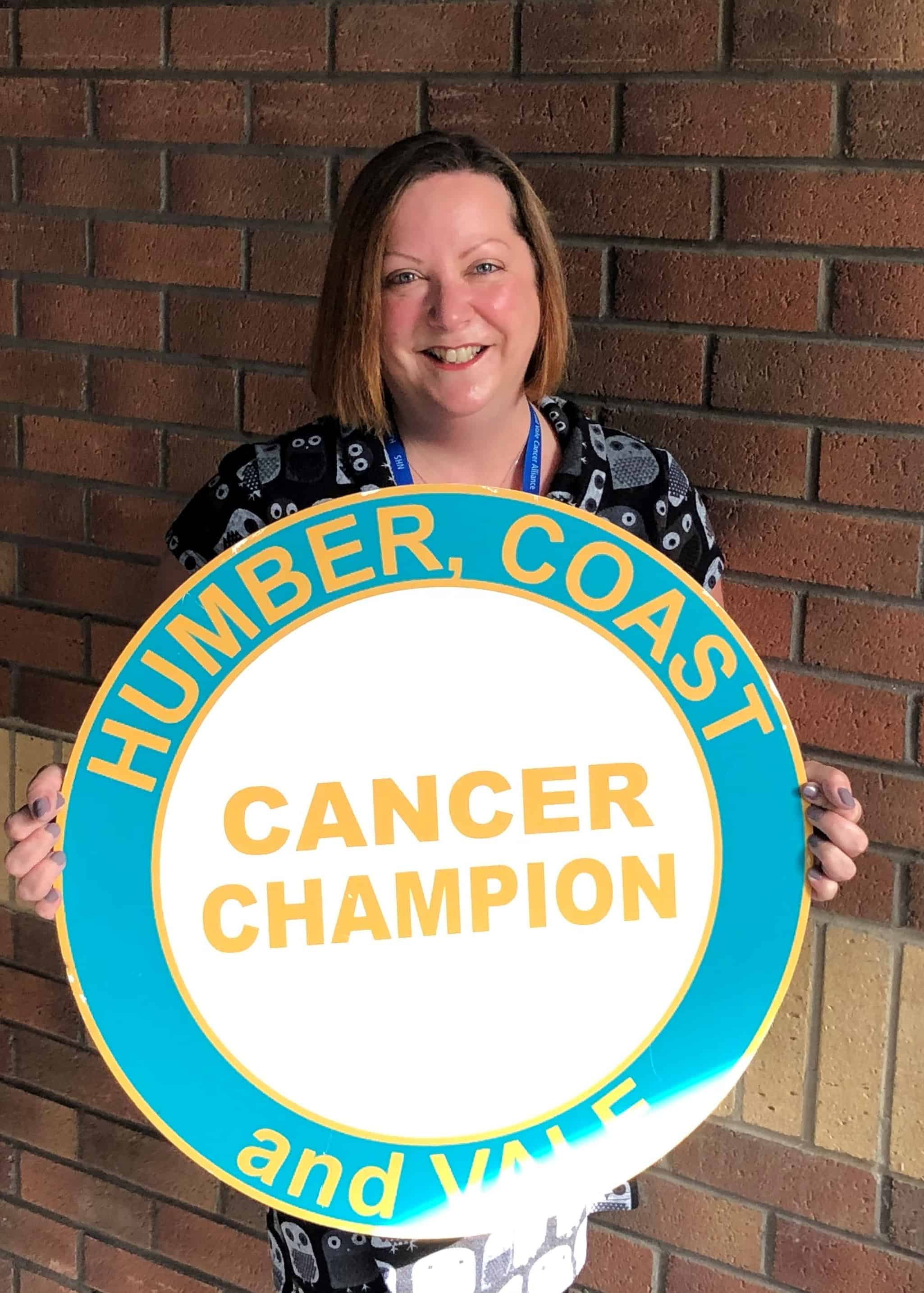
Tell us a little bit about yourself
First and foremost I’m a Mum to 4 amazing children. I’m an ex special needs teacher and twice cancer survivor having had Ovarian cancer in 1995 at the age of 17 and Breast cancer in 2013 at 35. I originate from the Midlands and brought my children up in Cornwall. Whilst I miss the Cornish beaches, I’m very much at home here in York, especially having found a couple of stunning beaches on the Yorkshire coast. I run a local breast cancer support charity in my spare time and my weekends are spent walking my dog Riley, watching my son play football or cooking with my daughter. I can bake far too well and I crochet not well enough.
What is the best part of your job?
Making a lasting, often life-long impact on people’s lives. The messages we deliver can be passed out far and wide as well as down the generations and have the potential to save many lives. Recently, I had a message from someone had heard me speak about cancer awareness. She wrote “A few months ago I found a lump. Thanks to you I knew how to check. It turned out it was ‘just’ a cyst but if it hadn’t been for you I might not have known to check myself regularly. I just wanted to say thank you and keep doing what you do”. This is all the evidence I need to continue to have a passion for spreading cancer awareness.
What does delivering Cancer Champion awareness sessions mean to you?
It’s personal. I often joke that I’m so fed up of cancer forcing its way into my life that I have taken this job to gain some control over which area of my life it is involved with… but seriously, I do want to combine my cancer experiences with my teaching skills to try and limit the amount of people who have similar experiences to mine as both my cancers were found at stage 3, so my treatments have been gruelling and left me with lifelong side effects, as well as seriously impacting on my family and friends around me.
If you share one piece of advice about cancer, what would it be?
Cancer isn’t going away any time soon, so let’s protect ourselves with the information we need to spot cancers at the earliest possible stage, so that they can be treated less invasively and have the most successful outcomes. I’m sure we’d all agree that cancer isn’t the most cheery of subjects, but knowing that 1 in 2 people in the UK will develop cancer in their life time and that more than 50% of people diagnosed with cancer survive it, clearly shows that cancer isn’t necessarily a death sentence anymore.
The Cancer Champion team do our best to make the session light and add some humour and we know it’s well received. One of our recently trained Cancer Champions told us “In those short 90 minutes I leant so much about cancer and also really enjoyed myself – something I didn’t expect with such a serious topic!”
It’s easier than you think to make a difference. Take part in free a 90 minute cancer awareness session and learn how to spot the early signs and symptoms of cancer.
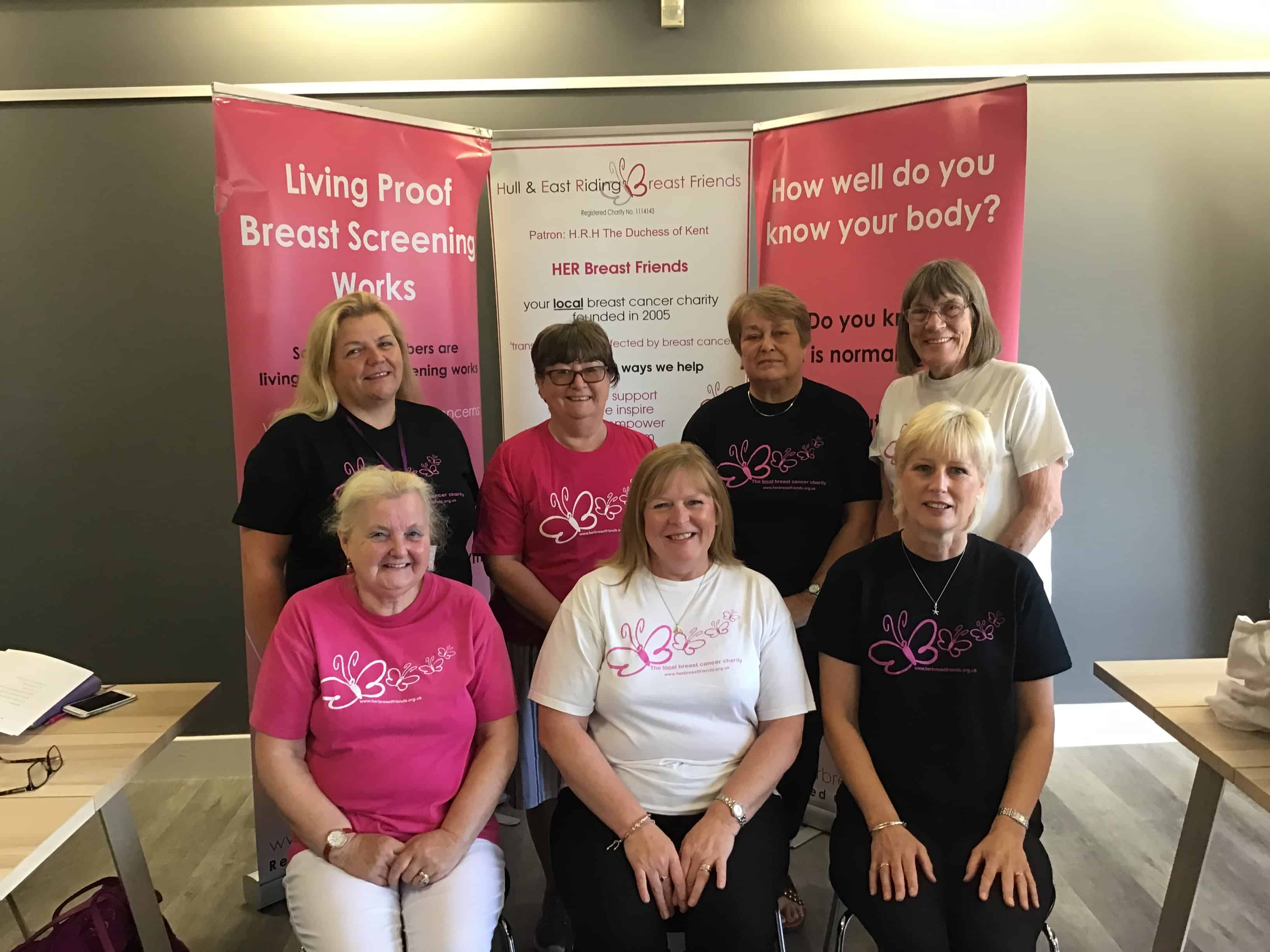
Hull and East Riding Breast Friends, known as HER Breast Friends, is a small local registered charity founded in 2005 by two ladies, Jan Jones and Liz Drury, who at the time were both undergoing treatment for breast cancer at Castle Hill Hospital. While Jan and Liz are sadly no longer with us, every day the impact of what they achieved is felt by everyone at HER Breast Friends and beyond. Here, group Trustee and breast cancer survivor Pam tells us about everything the group does.
Jan and Liz realised there was a need for a group that didn’t focus on the disease, but more on the emotional and practical side of things. They wanted to use the experience they were going through in a positive way, to help not only themselves but others that would undoubtedly follow. The pair initially began by fundraising for comfy chairs in the breast care unit and oncology ward at Castle Hill Hospital. As more people became aware of their activities, the group grew and HER Breast Friends was formed.
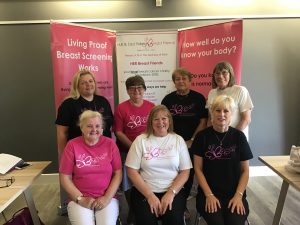
The group’s aim is to create a positive environment offering encouragement and friendship, whilst also providing practical help for those going through their cancer journey.
From initially meeting in each other’s’ houses, larger meeting places were sought. Various church halls became our meeting place until 2011, when we acquired our own suite of rooms at the Chamberlain Business Centre on Chamberlain Rd, Hull. In 2018, the Charity moved to a more modern and accessible premises. The Octagon on Walker Street in Hull is where we’re still based today.
The charity is run by volunteers and supported by one full-time member of staff funded by grants. All of the aforementioned have been affected by breast cancer, either personally or through family, friends, or colleagues. After all, you do not have to have a diagnosis of breast cancer to be affected by it.
Membership for the group is open to both men and women and costs just £5.00 for the year. This money goes towards the cost of facilities, services and activities we run. As a member, you get a say at our AGM about how the charity develops, but you do not have to be a member to access all our facilities.
We are not medically trained and we do not offer medical advice about breast cancer or its treatment, but we are able to suggest and signpost to the people who can.
Our aim is to create a positive environment offering encouragement and friendship, whilst also providing practical help for those going through their cancer journey.
The butterfly was chosen as the symbol of the charity; while it means many things in different cultures, hope and transformation emerge as a common theme. The butterfly appears on our merchandise and can be found around the various rooms within the charity.
Possibly someone’s first point of contact with the charity would be if they received one of our patient gift packs, which we provide to the hospital for those having undergone surgery for breast cancer. It’s a small bag of toiletries and treats along with a cushion, currently made by our craft group and other voluntary groups. The cushion is ideal to rest your arm or head-on, but they come into their own when travelling home for seat belt comfort. More recently, we’ve also included our FUN stress-relieving dammit dolls and an information folder to let people know that they are not alone, we are thinking of them, and we are here if they need us.
Our support also includes a wig bank, which we’re currently providing via a home delivery service, our Buddleia therapy service, a bra service, a Wednesday craft group, dance night, and the occasional trip!
Our flagship event is our Pink Pamper Day, which caters for up to 100 people with a diagnosis of breast cancer to be thoroughly pampered, attend a variety of workshops, enjoy a lovely lunch and as in previous years make some long-lasting friendships. 2020 is the first year since 2006 that it has been cancelled.
Usually, our premises are open Monday to Friday, from 10 am until 4 pm. for anyone to pop in if they wish… the kettle is always on! However, we’re currently closed due to COVID-19.
Since the start of the pandemic, we have engaged our members and supporters in various activities such as a weekly quiz provided by Simon, one of our Trustees, and a bakery corner with various delicious recipes provided by our members.
Our Buddleia therapists provide a calming distanced Reiki session each Tuesday at 3 pm. This can all be accessed via our website and social media pages.
Our Craft Group has continued their amazing work from home, providing the heart cushions, dammit dolls, seat belt cushions and face masks.
Unfortunately, activities such as the dance class and monthly meetings, which often feature guest speakers, have now come to a halt, along with all our fundraising events in what would have been our celebratory 15th year supporting local people affected by breast cancer!
In November 2010, I was going away for a weekend with friends. I had lost my hair through chemo and therefore thought it would be a nice idea to get a wig. Little did I realise how expensive wigs can be! During a hospital visit, my husband came across a HER Breast Friends information booklet. They were a support group with a difference and of course they had a Wig Bank!
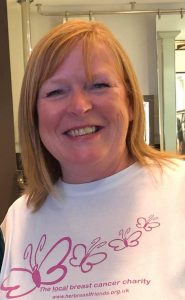 I contacted the charity and met the lovely founder, Jan Jones, who came with a variety of wigs for me to try. I must admit I had fun with my best friend trying them on!
I contacted the charity and met the lovely founder, Jan Jones, who came with a variety of wigs for me to try. I must admit I had fun with my best friend trying them on!
I said earlier that HER Breast Friends is a support group with a difference. I think of these groups as people sitting around a table discussing their illness, but I couldn’t have been more wrong! The first meeting I attended, I thought I was in the wrong place, as all I could hear was laughter. Everyone is so positive.
I began volunteering with the charity by helping at events, but when a Breast Awareness Team was developed in 2012, I quickly became involved. After all, if I didn’t know the signs to look out for, I imagined there were others who weren’t aware too.
The team (all volunteers) deliver talks to groups such as WI’s, ladies groups, schools – basically anywhere that we are asked! These talks cover the signs and symptoms to look out for and help encourage the uptake of breast screening while also dispelling some of the myths and fears that may accompany breast cancer and screening in what has been described as a fun but informative manner on a serious subject.
We also hold events at various locations, such as leisure centres, shopping centres and markets.
Ten years on, I am now a Trustee of the Charity and lead the Breast Awareness Team. This year, due to COVID-19, our talks have been halted, although I did take part in my first webinar talk to the Hull Women in Business Group. Online is currently the way to go but myself and the team much prefer that face-to-face social contact, which we will hopefully, soon be able to get back to!
Find out more about the group at www.herbreastfriends.org.uk
You can also find them on Facebook, Twitter, Instagram and even YouTube.
Contact the team by email on [email protected] or call 01482 221368.
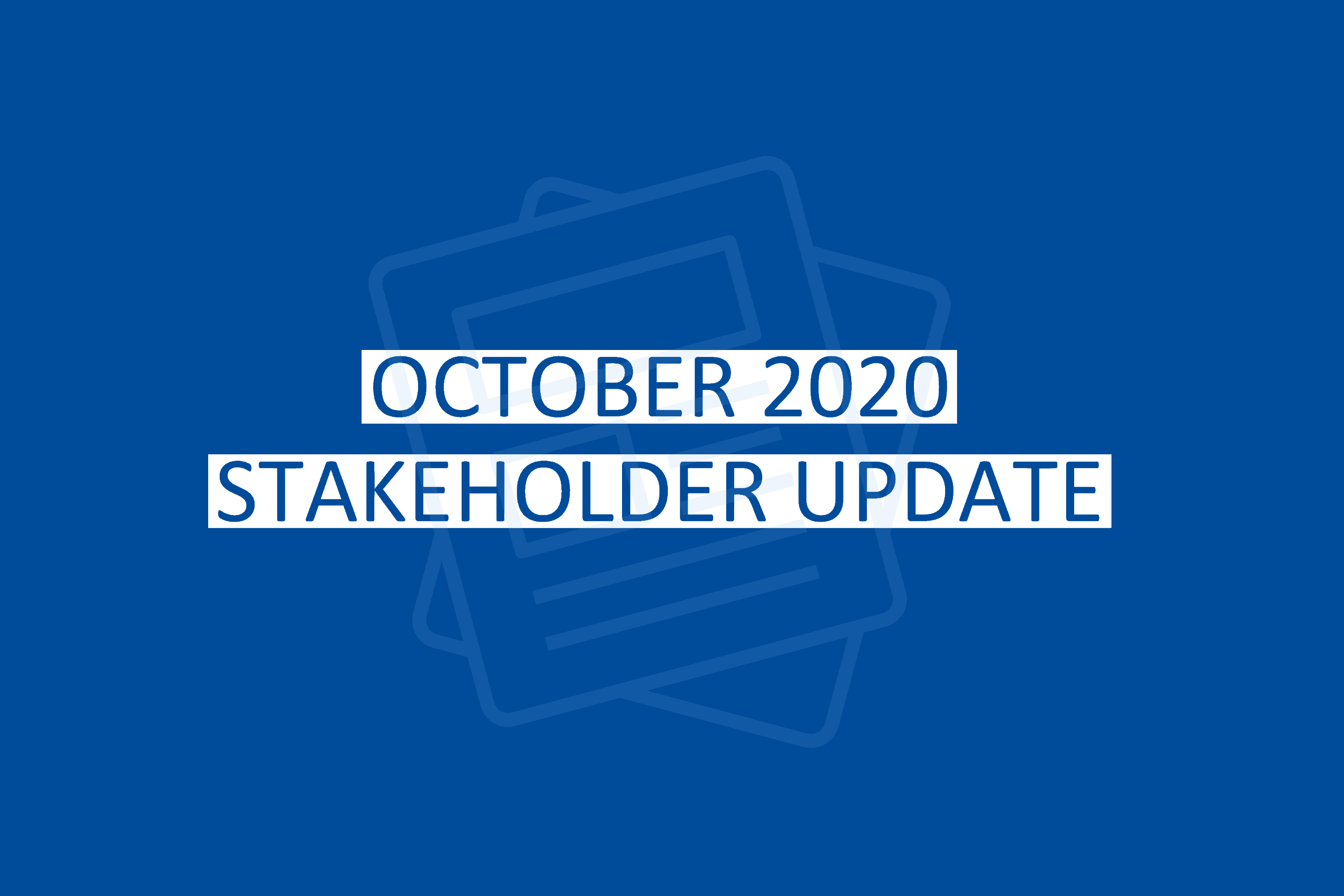
Update (30th October 2020): The NHS Lung Health Check Service, which was due to re-start in Hull on 3rd November 2020, will continue to be paused due to Covid-19. Humber, Coast and Vale Cancer Alliance is in on-going discussions with partner organisations regarding the re-start and will provide more information once available.
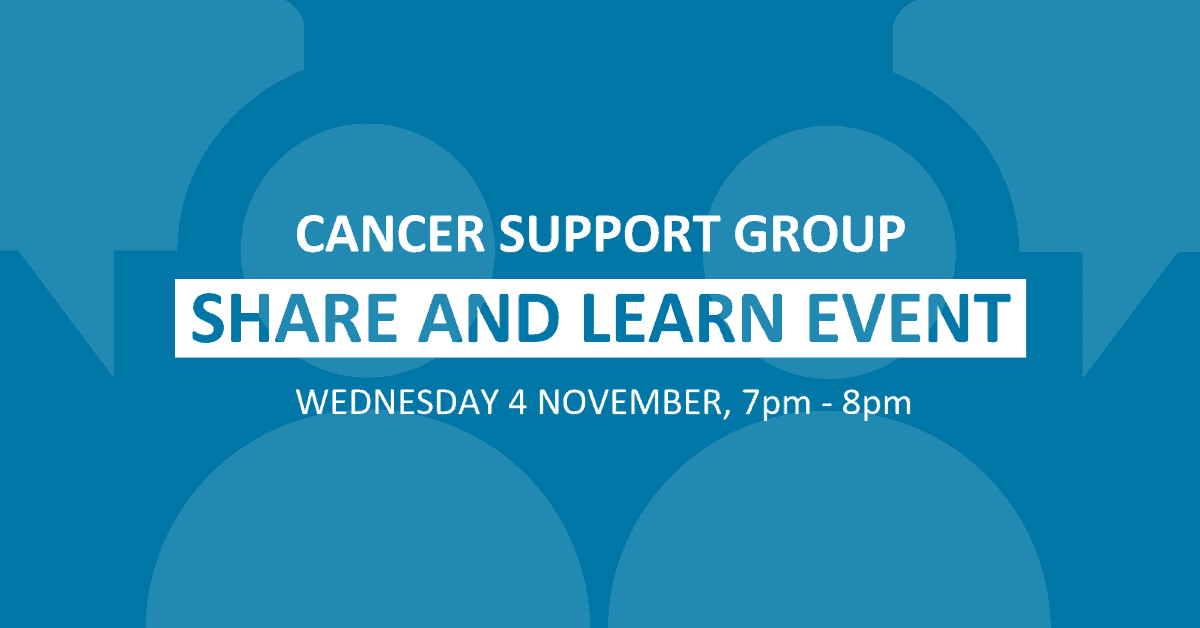
Humber, Coast and Vale Cancer Alliance (HCV CA) is inviting cancer support groups to take part in a free online share and learn event.
Support groups from Scarborough and Ryedale, Hull, Vale of York, North Lincolnshire, North East Lincolnshire and the East Riding of Yorkshire are invited to take part in the free event which will take place via Microsoft Teams on Wednesday 4 November 2020, 7pm – 8pm.
Recognising that many support groups across the HCV region have either paused or adapted their services as a result of the coronavirus pandemic, the event aims to provide local groups with an opportunity to share experiences, ask questions, meet similar groups from across the region and learn about the work of the Alliance.
The Cancer Alliance brings together all the organisations that commission and provide cancer services in the HCV area, enabling effective and co-ordinated partnership working to improve patient experience. By working in collaboration with local cancer support groups, the Alliance aims to ensure their work is informed and influenced by patients, carers, the public and other key stakeholders.
Alison Cockerill, Macmillan Personalised Care Programme Manager at HCV CA will be leading the online event and said: “Since the start of the coronavirus pandemic, we have spoken with several cancer support groups from across our region that have either paused their activities or have had to adapt in order to continue supporting those receiving personalised care.
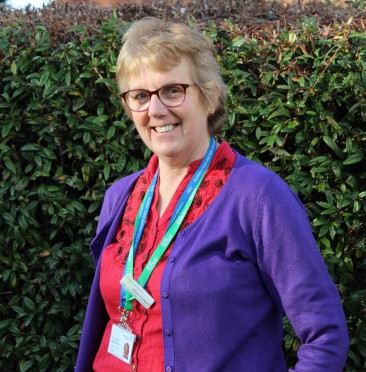
“As an Alliance, we want to ensure our population is aware of the health and wellbeing support available and that groups have an opportunity to network, share and learn from each other within a supportive environment.
“We will also be using the event to update local support groups about some of the exciting work that is taking place across the Alliance, for example the recent launch of a new NHS England and NHS Improvement Quality of Life Survey which recognises that quality of life (QoL) outcomes are as important to patients as survival and asks patients ‘how are you doing?’.
Representatives from Macmillan Cancer Support and Cancer Care Map will also be attending the event, as the Alliance continues to raise awareness of health and wellbeing support from across the HCV region and beyond.
To find out more about Humber, Coast and Vale Cancer Alliance, visit www.hcvcanceralliance.org.uk or click here to sign up for the event.
If you are interested in adding your cancer support group to the Humber, Coast and Vale directory, please email [email protected].
